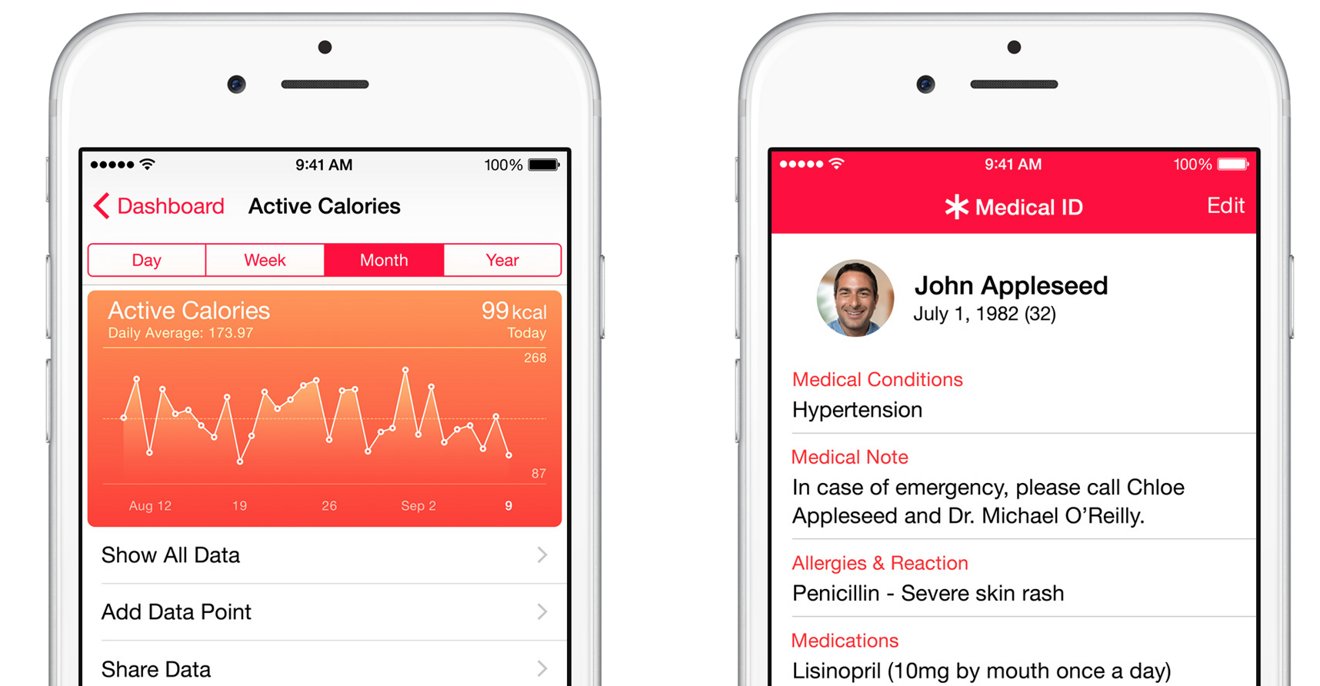Following a deluge of health and fitness devices announced at CES, one analyst has said he believes Apple's Health application and HealthKit tools for developers will help foster a diverse ecosystem that will further differentiate the iPhone from competing platforms.
Analyst Steven Milunovich of UBS issued a note to investors on Monday, a copy of which was provided to AppleInsider, in which he praised the strength of what he calls the "Applesphere." That wide range of apps and accessories that connect to Apple's ecosystem is only expected to grow further, he said, thanks to the healthcare industry.
The analyst envisions future devices in the form of necklaces that can monitor heart function, and headbands that can track brain waves. He cited future iPhone attachments that could allow lab tests of blood, liver, kidney, urine, breath and sweat.
On the application side, Milunovich sees FDA-approved software that could allow for users to diagnose their own ear, eye, throat, lung and heart issues. And he also expects routine video consultations from mobile devices following communication of health-related findings to caregivers.
"We expect that health apps will provide brand and device differentiation for Apple in coming years, though it will take time given hurdles such as FDA approvals," Milunovich said.
The analyst sees opportunities for Apple to monetize this growing ecosystem, through Made for iPhone certified accessories, paid applications, and Apple Pay support. But to Milunovich, the key factor here is platform differentiation, giving iOS a leg up on competing devices running operating systems like Google's Android.
"Apple offers access to sophisticated users through one contact point," he said. "It all adds up to what Tim Cook calls a mega-ecosystem across multiple consumer use cases, or what we call the Applesphere."
UBS has maintained its "buy" rating for shares of AAPL, with a 12-month price target of $125.
The launch of iOS 8 last fall marked the official beginning of Apple's push into the health and fitness space. HealthKit is a series of tools for developers allowing them to share data with other apps and services, while the corresponding Health app lets users track their nutrition, activity, calories burned and far more all in one centralized location.
Already there are a wide variety of applications and accessories that are compatible with HealthKit, tracking everything from weight and activity to blood glucose and blood alcohol content.
But with iOS 8 and HealthKit only on the market for a few months, the accompanying ecosystem is expected to grow substantially. Most notably set to enter the fray is Apple's own wearable device, the Apple Watch, which will track fitness, activity, heart rate and more when it launches early this year.
 Neil Hughes
Neil Hughes








-m.jpg)






 Charles Martin
Charles Martin

 Malcolm Owen
Malcolm Owen
 William Gallagher
William Gallagher

 Christine McKee
Christine McKee
 Wesley Hilliard
Wesley Hilliard









8 Comments
UBS is missing a key element - in-ear headphones.
Can you say "wild speculation"? Software is of minor importance. First, sensors for health issues need to be invented and developed. In many cases, this means sensors that can be embedded. Think of this as a 20-year development cycle -- typical in research to product. All this needs to be in development at the university level. Assuming we're 10 years into the research phase, we've got 10 more years before useful products will be available -- and at a high initial price. Okay, we might have products backed by claims but no science on the market sooner for those morons with too much money. But the rest will have to wait.
[quote name="waldobushman" url="/t/184272/ecosystem-of-health-focused-apps-accessories-will-further-strengthen-apple-ubs-says/0_100#post_2660321"]Can you say "wild speculation"? Software is of minor importance. First, sensors for health issues need to be invented and developed. In many cases, this means sensors that can be embedded. Think of this as a 20-year development cycle -- typical in research to product. All this needs to be in development at the university level. Assuming we're 10 years into the research phase, we've got 10 more years before useful products will be available -- and at a high initial price. Okay, we might have products backed by claims but no science on the market sooner for those morons with too much money. But the rest will have to wait.[/quote] And even then, you need enough people interested in them. If the money's not there, they'll disappear.
Can you say "wild speculation"?
Software is of minor importance. First, sensors for health issues need to be invented and developed. In many cases, this means sensors that can be embedded. Think of this as a 20-year development cycle -- typical in research to product. All this needs to be in development at the university level. Assuming we're 10 years into the research phase, we've got 10 more years before useful products will be available -- and at a high initial price.
Okay, we might have products backed by claims but no science on the market sooner for those morons with too much money. But the rest will have to wait.
Disagree. Health data is going to be very sticky. Even more so than music. People care about their health data and once they get used to it being in iOS, they won't go anywhere else. Why do you think Garmin has a lock on runners and bikers? I have years of data stored in software that interacts with Garmin devices. And despite Garmin's over-priced shitty hardware, I still buy it because it isn't worth it to move my data somewhere else.
Health care data will feed on itself. The more people with health care data in iOS, the more devices that will be available. The more devices that are available, the more data that will be stored in iOS. Apple got this one right. HealthKit is going to be huge.